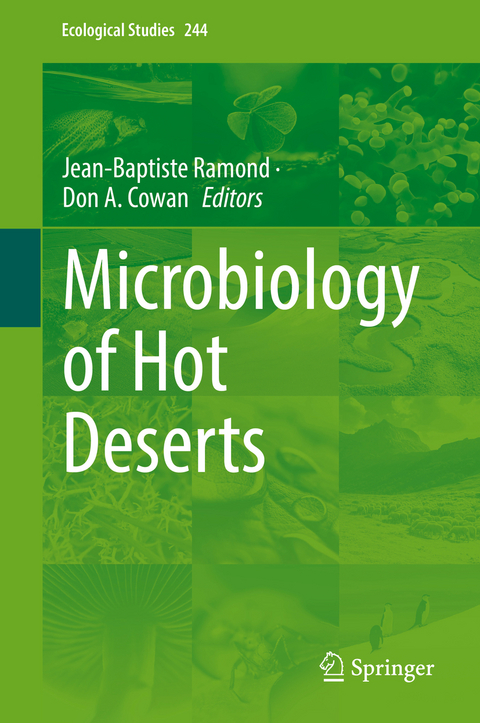
Microbiology of Hot Deserts
Springer International Publishing (Verlag)
978-3-030-98414-4 (ISBN)
This book covers the wider aspects of the microbiology of hot desert soil ecosystems, compiling disparate information from a range of relevant desert soil microbial fields.
The reader learns about microbial ecology of the more dominant and possibly most important desert habitats, detailing the phylogenetic and functional diversity of these different habitats as well as their potential role in desert ecosystem ecology. Particular attention is also given to microbial stress adaptation in hot desert soils. Furthermore, it is the first volume in this particular field to cover modern metagenomics technologies that can be applied to studies of all aspects of desert microbial communities.
Additionally, the book explores viruses and viral communities, which are among the least studied (and little understood) components of desert soil microbial communities. Particular attention is also given to the roles of desert microbial communities in biogeochemical cycling of carbon, nitrogenand phosphorus. Through this book the reader discovers how desert microbiology has been at the forefront of Astrobiology and how it may be used conceptually in future terraforming strategies.
Desert ecosystems are increasingly coming into focus given the impacts of climate change and desertification trends, making this volume particularly timely. Each of the chapters is authored by leading international researchers and is a must-read for microbial ecologists.
lt;p> Dr Jean-Baptiste Ramond: Educated in France, Jean-Baptiste Ramond completed his PhD in Microbiology/Microbial Ecology in 2008. He then moved to South Africa for his postdoctoral research (2009-2012) to the University of the Western Cape (Cape Town) and a research fellowship at the Centre for Microbial Ecology and Genomics (CMEG) of the University of Pretoria (2012-2019). In 2019, he was appointed Assistant professor at the Pontificia Universidad Católica de Chile and in parallel is an Extraordinary Lecturer of the Department of Biochemistry, Genetics & Microbiology of the University of Pretoria (NRF C2-rated since 2021) and a Visiting Academic in the Faculty of Humanities and Social Sciences of Oxford Brookes University (UK). Using omics technologies, his research essentially aims at better understanding the adaptation of environmental microbial communities to extreme environmental conditions and climate change, particularly in deserts.
Professor Don A. Cowan: Don Cowan was educated in New Zealand at the University of Waikato and completed a period of postdoctoral study there before moving to University College London as a Lecturer in 1985. After 16 years in London, he accepted the position as Professor of Microbiology in the Department of Biotechnology at the University of the Western Cape, Cape Town, where he became Senior Professor and Director of the 60-strong Institute Microbial Biotechnology and Metagenomics. He moved to the University of Pretoria in May 2012 in the dual role as Director of both the University of Pretoria Institutional Research Theme in Genomics and his research group, the Centre for Microbial Ecology and Genomics. He is an NRF A1-rated researcher.
Don Cowan's research activities in microbial ecology encompass several fields, but are mostly linked by the theme of 'environmental extremes'. Since his PhD studies, he has retained an interest in the ecology and enzymology of extreme thermophiles, organisms living in heated soils and hot water. For the past two decades he has worked on the microbial ecology of Namib Desert soils and at the lower end of the biotic temperature scale, studying the microbiology of the Dry Valleys of Eastern Antarctica in collaboration with researchers from all over the world.
Chapter 1: A Brief Introduction to Hot Desert Environments: Climate, Geomorphology, Habitats and Soils.- Chapter 2: Novel methods for studying the structure and function of hot desert microorganisms and their communities.- Chapter 3: Phototrophic Mats of the Desert: The Bacteria of the Biological Soil Crust Community- Chapter 4: Microbial Ecology of Hot Desert Soils.- Chapter 5: Biology of Desert Endolithic Habitats.- Chapter 6: Journey of a thousand miles: The evolution of our understanding of viruses in hot Deserts.- Chapter 7: C, N and P nutrient cycling in Drylands.- Chapter 8: Diversity and plant growth promoting properties of microbiomes associated with plants in desert soils.- Chapter 9: Insights of Extreme Desert Ecology to the Habitats and Habitability of Mars.- Chapter 10: Survival under stress: Microbial adaptation in hot desert soils.- Chapter 11: The response of soil microbial communities to hydration and desiccation cycles in hot desert ecosystems.- Chapter 12: Hot Desert Microbiology: Perspectives in a Warming World.
| Erscheinungsdatum | 30.07.2022 |
|---|---|
| Reihe/Serie | Ecological Studies |
| Zusatzinfo | XVI, 349 p. 49 illus. in color. |
| Verlagsort | Cham |
| Sprache | englisch |
| Maße | 155 x 235 mm |
| Gewicht | 709 g |
| Themenwelt | Naturwissenschaften ► Biologie ► Ökologie / Naturschutz |
| Schlagworte | Biological Soil Crusts • climate change • Desert Astrobiology • Desertification • Desert water gradients • extremophiles • heat resistance, photoinhibition, desiccation • Hypoliths • microbial ecology • Namib, Atacama, Sahara • physiologicial adaptations • restore degraded drylands • Stress response |
| ISBN-10 | 3-030-98414-1 / 3030984141 |
| ISBN-13 | 978-3-030-98414-4 / 9783030984144 |
| Zustand | Neuware |
| Haben Sie eine Frage zum Produkt? |
aus dem Bereich


